Chinatowns
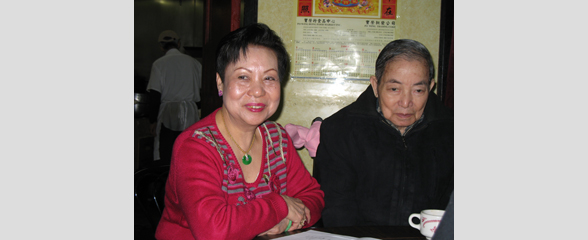
2008.040.018 Oral History Interview with Mr. and Mrs. Chan March 7, 2008
Mr. and Mrs. Chan, founders and owners of the long established and renowned coffee
shop and restaurant, Mei Lai Wah, in New Yorks Chinatown, are both Taishan natives, who claim that New York, especially their restaurant, is home to them. Upon arrival, Mr. Chan was employed at a bakery, the culinary training from which he later applied to his own business, Mei Lai Wah. Mr. Chan explains that he runs his business like a family and has not changed anything since he first opened it in 1968. He celebrates that his employees, who are also from the same village as Mr. Chan, have stayed with the business since its opening. As a result of rising rent, Mr. and Mrs. Chan have witnessed family-owned business closures and fear that the increasing expense of living in Chinatown may drive Chinese immigrants to settle outside of the unique cultural community. Despite their concerns over rent increases and their employees increasing age, both Mr. and Mrs. Chan hope to sustain their beloved business for as long as possible. Ultimately, when Mr. and Mrs. Chan decide to retire, they will not be handing down the restaurant to their children since none of them have expressed interest in continuing the operations of the business or living in Chinatown.
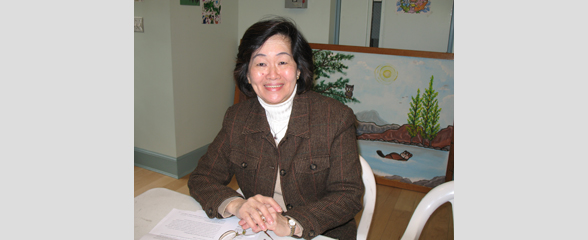
2008.040.025 Oral History Interview with Connie Ling February 12, 2008
Connie Ling, born in the Philippines and later a resident of Hong Kong during the 1960s, summarizes her experiences emigrating with her husband from Hong Kong to New York in 1967. Ling initially lived and worked in Chinatown, where she found employment as a machine operator in a garment factory. During her ten years working for the garment industry, Ling recalls an influx of Chinese immigrants and substantial growth in industrial businesses. After serving as a factory chairwoman for several years, she was eventually recruited as a union representative for UNITE in 1982, speaking for workers rights and mediating conflicts between workers and employers. At the time of her interview, Ling estimated that there were only approximately 100 union garment factories left. She attributes this decrease to the aftermath of September 11th, which caused commercial rent to double and garment industries to outsource labor to Sri Lanka, Mexico, and China. Ling also talks about the gentrification in Chinatown, stating that new condominiums are replacing old shops and factories while rent inflation is forcing old residents to move out of Chinatown. She goes on to note the growth among the Fukienese and Puerto Rican immigrant populations in the Lower East Side and expresses discontent with the growing number of Caucasian residents in Chinatown. Ling concludes by reflecting on how Chinatown’s garment industry is not likely to return due to significant changes in manufacturing and rent.
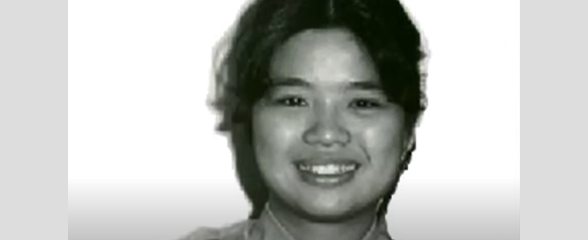
2008.041.001 Oral History Interview with Agnes Chan
In 1980, Agnes Chan graduated at the top of her Police Academy class and became the NYPD’s first Asian female officer. In this position, she sought to build bridges between the Asian community and the police department. Promoted to Detective rank in 1984, Chang served 20 years in the NYPD, including Chinatown’s 5th precinct. She retired in 2000.
Chan initially went to John Jay College with the vision of going to law school but after an internship in Chinatown, she decided to join the police department, which at the time was looking to recruit more minority and Asian officers to work with the community. Despite numerous pressures to quit during training at the police academy, Chan persevered and became the first Asian female police officer at the New York City Police Department. Having grown up understanding traditional Chinese culture and values, she saw herself as uniquely equipped to work as an officer in the community. While other officers might interpret avoiding eye contact as a likely sign of deceit, Chan understood that in an Asian cultural context could simply signify fear or respect. While stationed in Spanish Harlem, Chan frequently perceived that people would look at her as a 5’2†Asian female officer and question what Chan could do for them. However, Chan responds that not all situations can be resolved by physical strength and the use of a weapon and require talking to people and having conversations. She asserts that most police officers are service-oriented and that the majority of them are there to help people and the community, often at their worst moment.
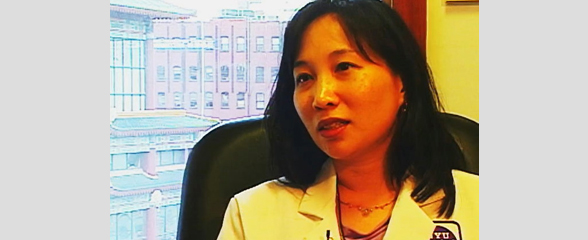
2014.036.001 Oral History Interview with Blanche Leung June 16, 2004
Blanche Leung, M.D., was born on April 16, 1970 in Queens, New York to immigrant parents from Hong Kong and Canton, China. She sits down to recount the immigration story of her parents, from when they left China as young children following the Communist changeover to their time in Hong Kong, Taiwan, Canada and the United States, where they ultimately settled in 1969. Her father was a pharmacist and her mother was a hematology lab manager. She talks extensively about the family pharmacy located on Lafayette and Walker Streets, which served as a focal point for the family. Blanche and her mother frequently went to assist at the pharmacy in addition to spending time in the Chinatown area for errands and extracurricular activities such as ping pong and Chinese School even though they lived in Elmhurst, Queens.
Her childhood relationship with the Chinatown community and the New York Chinese community evolved when she became a medical professional and served as a liaison between Chinese patients and other hospital staff to improve the quality of care. She would later open a practice in Chinatown and describes the interactions she has with her Chinese patients. The interview conversation transitions from talking about Chinese-speaking patients and Chinese language medical resources to her experiences during and after the 9/11 attack. Blanche describes the emotional and physical impact on Chinatown following the terrorist attack in the context of her patient care, diagnosis, and medical requests in addition to the change in the street scene in the aftermath. She concludes the interview with answers to questions regarding Chinatown rebounding from 9/11 and her intentions to continue her medical practice in Chinatown amidst the ever-changing demographics and geography of Chinatown.
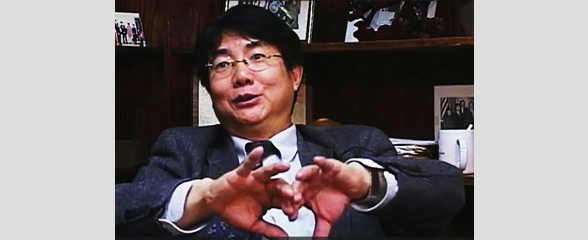
2014.036.014 Oral History Interview with David Chen July 10, 2003
During the interview, David Chen discusses his experience as a Chinese American activist and director of the Chinese-American Planning Council (CPC), and his theory of activism. When Chen was younger, he rarely spoke. He would always wait for someone else to say the right thing, to which he would then agree. One time, as a younger student, he was forced to present a project because two of his partners did not show up. One of his classmates expressed how well-spoken he was and at that moment, Chen realized that his voice could be heard. Chen believes that in order to be an activist for peace and justice, one must see the bigger picture. Effective activism should start with institutions because that is how change can be enacted. He believes that anyone can be an activist as long as they talk, remember, observe, and are skeptical of organizations. He states that while spontaneous change comes from the bottom, sustaining change comes from the top, more specifically, from organizations. Chen joined the Organization of Chinese Americans in order to advocate for what he wanted to stand for and speak freely on those subjects. However, he also believes that a successful organizer does not talk too much because activism is about observing the smaller issues. As an activist, he believes that trust must be gained from individuals. Chen agrees that the Asian American rights movement was inspired by the Civil Rights Movement. Overall, he believes that society as a whole has become more willing to change and hopes that individuals, especially young activists, continue to act, give voice, and intellectualize.
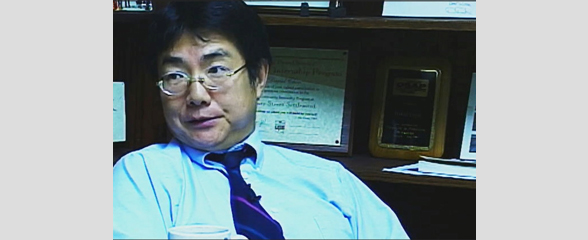
2014.036.015 Oral History Interview with David Chen July 13, 2004
In this interview, David Chen discusses his work at Chinese-American Planning Council (CPC) as an activist in New York City Chinatown. Chen is the director of CPC, a private organization started in 1965 serving the public and focusing on low-income immigrant families, mostly Chinese. Services offered include language classes, translations, daycare centers, job training for adults, senior citizen care, childcare, and Meals on Wheels. Prior to his work at CPC, Chen worked for the mayor in Chicago. While there, he constantly questioned why there was no Chinese funding. While in college, Chen studied to be a social worker and community organizer. He explains that he was not good at chemistry and did not want to pursue medicine or law like his parents expected him to. During college, he and his friends volunteered in Chicago Chinatown, which is much smaller than New York City. In Chicago Chinatown, Chen and his friends taught English classes but there were not many job opportunities in the community, so he decided to work for the government. On a visit to New York City, Chen fell in love with how densely populated and large Chinatown was and was told that there were many job opportunities available. He applied for a position at CPC as a youth director twenty-three years ago, accepted the role, and moved to New York City. Chen was part of "Project Reach", which was an at-risk prevention program for troubled kids. He describes Chinatown as a transient neighborhood in that there is constantly an influx of Chinese immigrants every few years. CPC serves those immigrants by helping them get entry-level jobs and helping them get their foot in the door. By doing so, he hopes that secure immigrants who have gotten aid from CPC would be able to help the next wave. Asked about his upbringing, Chen shares that he is from an upper-middle class family and that his father was an engineer. He was originally born in Shanghai but his family moved to Hong Kong while he was a baby. He came alone to the United States during his final year of high school and focused on school in order to avoid being drafted into the Vietnam War. The last part of the interview briefly covers 9/11. Chen notes that in the recovery and aftermath, Chinatown was largely ignored although it was an adjacent neighborhood to the World Trade Center. Chen also describes how important Chinatown is to tourism because of its restaurants and shopping venues.

2014.036.015 Oral History Interview with David Chen July 13, 2004
In this interview, David Chen discusses his work at Chinese-American Planning Council (CPC) as an activist in New York City Chinatown. Chen is the director of CPC, a private organization started in 1965 serving the public and focusing on low-income immigrant families, mostly Chinese. Services offered include language classes, translations, daycare centers, job training for adults, senior citizen care, childcare, and Meals on Wheels. Prior to his work at CPC, Chen worked for the mayor in Chicago. While there, he constantly questioned why there was no Chinese funding. While in college, Chen studied to be a social worker and community organizer. He explains that he was not good at chemistry and did not want to pursue medicine or law like his parents expected him to. During college, he and his friends volunteered in Chicago Chinatown, which is much smaller than New York City. In Chicago Chinatown, Chen and his friends taught English classes but there were not many job opportunities in the community, so he decided to work for the government. On a visit to New York City, Chen fell in love with how densely populated and large Chinatown was and was told that there were many job opportunities available. He applied for a position at CPC as a youth director twenty-three years ago, accepted the role, and moved to New York City. Chen was part of "Project Reach", which was an at-risk prevention program for troubled kids. He describes Chinatown as a transient neighborhood in that there is constantly an influx of Chinese immigrants every few years. CPC serves those immigrants by helping them get entry-level jobs and helping them get their foot in the door. By doing so, he hopes that secure immigrants who have gotten aid from CPC would be able to help the next wave. Asked about his upbringing, Chen shares that he is from an upper-middle class family and that his father was an engineer. He was originally born in Shanghai but his family moved to Hong Kong while he was a baby. He came alone to the United States during his final year of high school and focused on school in order to avoid being drafted into the Vietnam War. The last part of the interview briefly covers 9/11. Chen notes that in the recovery and aftermath, Chinatown was largely ignored although it was an adjacent neighborhood to the World Trade Center. Chen also describes how important Chinatown is to tourism because of its restaurants and shopping venues.